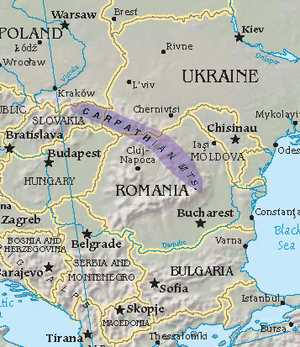On 6 January 2024 the Framework Convention on the Protection and Sustainable Development of the Carpathians (the "Carpathian Convention") entered into force. The Convention is designed to develop a comprehensive policy for the protection and sustainable development of the Carpathians, a transboundary mountain range shared by the seven signatories of the Convention. The signatories to the Carpathian Convention are the Czech Republic, Hungary, Poland, Romania, Serbia & Montenegro, Slovak Republic, and Ukraine.
I. Background: Development of the Carpathian Convention
 In 2001 the Ukranian government requested the United Nations Environment Programme, Regional Office for Europe, "to service a regional cooperation process aim[ed] at the protection and sustainable development of the Carpathians."[1] In response, the United Nations Environment Programme promoted the Alpine-Carpathian Partnership and fostered five negotiation meetings of the Carpathian countries, resulting in the adoption of the Carpathian Convention in May 2003.[2] The Carpathian Convention is modeled on the Convention on the Protection of the Alps (the "Alpine Convention"), which entered into force in 1995.[3]
In 2001 the Ukranian government requested the United Nations Environment Programme, Regional Office for Europe, "to service a regional cooperation process aim[ed] at the protection and sustainable development of the Carpathians."[1] In response, the United Nations Environment Programme promoted the Alpine-Carpathian Partnership and fostered five negotiation meetings of the Carpathian countries, resulting in the adoption of the Carpathian Convention in May 2003.[2] The Carpathian Convention is modeled on the Convention on the Protection of the Alps (the "Alpine Convention"), which entered into force in 1995.[3]
II. Substantive Provisions of the Carpathian Convention
 Consisting of 23 Articles, the Carpathian Convention's general objectives mandate that the "Parties shall pursue a comprehensive policy and cooperate for the protection and sustainable development of the Carpathians with a view to inter alia improving quality of life, strengthening local economies and communities, and conservation of natural values and cultural heritage."[4]
Consisting of 23 Articles, the Carpathian Convention's general objectives mandate that the "Parties shall pursue a comprehensive policy and cooperate for the protection and sustainable development of the Carpathians with a view to inter alia improving quality of life, strengthening local economies and communities, and conservation of natural values and cultural heritage."[4]
The Carpathian Convention sets a broad framework addressing such issues as integrated land resources management, conservation and sustainable use of biological and landscape diversity, spatial planning, sustainable and integrated water/river basin management, sustainable transport and infrastructure, sustainable tourism, industry and energy, cultural heritage and traditional knowledge, and environmental monitoring and early warning.[5] As a "framework" agreement, the Carpathian Convention provides policy guidance and leaves the creation of specific protocols and policies for the Conference of Parties. For example, the Convention does not geographically define the Carpathian region, leaving that function to the Conference of the Parties.[6]
III. Current Status of States Parties
Entering into force on 4 January 2006, the Carpathian Convention has been ratified by four of the seven signatories (Czech Republic, Hungary, Slovak Republic, and Ukraine). Poland, Romania, and Serbia & Montenegro are yet to ratify the Carpathian Convention. The first Conference of the State Parties must occur no later than 4 January 2007.[7]
IV. Further Information
- The Carpathian Convention (homepage)
- Text of the Carpathian Convention
- Status of Ratification
- United Nations Environment Programme
- Alpine Convention
[1] The Carpathian Convention, "History of the Convention," available at http://www.carpathianconvention.org/history.htm.
[2] Id.
[3] See Convention on the Protection of the Alps, Nov. 7, 1991, available at http://www.convenzionedellealpi.org/page2_en.htm.
[4] Framework Convention on the Protection and Sustainable Development of the Carpathians, art. 2(1), May 22, 2003, available at http://www.carpathianconvention.org/text.htm.
[5] Id. art. 3-12.
[6] Id. art. 1(1).
[7] Id. art. 14(3).

